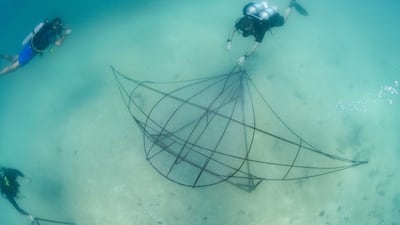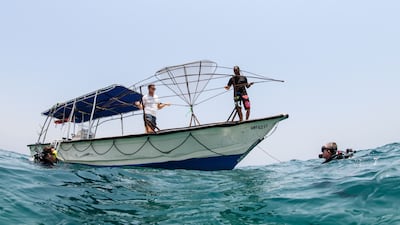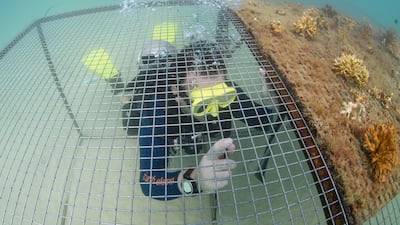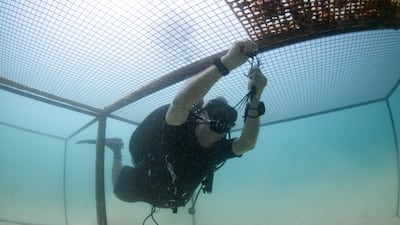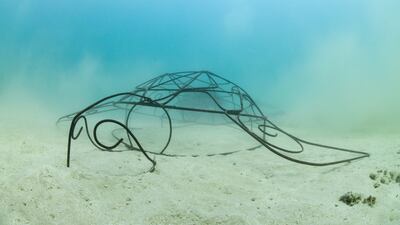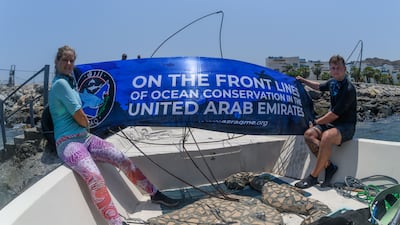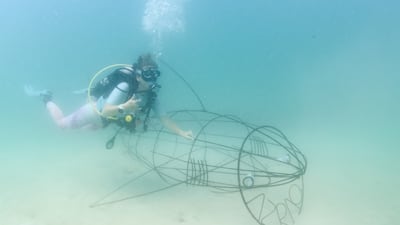Artificial reefs in the shape of marine creatures are set to transform a stretch of barren, sandy seabed off the coast of Fujairah into a blooming coral reef within months.
The environmental project by Freestyle Divers diving centre in the northern emirate challenged schools to design a metal wire template on which new living coral could be grown.
Businesses joined the scheme by sponsoring underwater tracking for each of the 15 structures across 100 square metres, to see how they will grow in the coming years.
The first frames were sunk on Saturday, 300 metres from shore in an area protected from fishing and dredging.
It is the latest programme in the UAE to regenerate areas where marine life is threatened by climate change, overdevelopment and habitat destruction.
marine conservationist
“Coral reefs are the most biodiverse places on the planet, and the oceans provide more than two thirds of the oxygen we breathe,” said James Campbell, a marine conservation manager and diving instructor with Freestyle Divers.
“We are planting trees to compensate for deforestation, we hope planting coral reefs will have similar impact.
“Coral is resilient but it is dying, which tells us something is seriously wrong," Mr Campbell said.
“By creating new space for coral reefs and education programmes in marine conservation we can start to halt this trend.”
Coral reefs require an artificial substrate on which to grow, in relatively shallow water of between six to eight metres with access to sunlight.
Branching corals have been planted on frames shaped like a whale shark, a stingray, two turtles and logos of supporting companies. These corals should grow up to 20 centimetres a year.
Nursery frames recently laid around nearby Dibba Rock have already become home to batfish, reef sharks and turtles.
Mr Campbell developed a similar project on the island of Ko Tao in Thailand. Ten years on, the reefs there are thriving.
“Ecotourism is huge and there is no reason why Fujairah and the east coast should not become a haven for new coral reefs and diving.
“Action needs to be taken now, before it is too late.”
Marine biologists estimate about half of the world’s coral has disappeared over the past 40 years – with only 10 per cent likely to remain by 2050.
Warming seas have placed huge swathes of coral reef at risk around the world.
Water temperature in the Gulf can range from 22°C to 35°C, with some corals able to withstand warmer waters.
But elsewhere, such higher temperatures can be devastating.
Coral bleaching events occur when heat causes corals to expel the algae that provides them with nutrients, colour and energy.
On the Great Barrier Reef, off the east coast of Australia, three mass coral bleaching events have killed 50 per cent of shallow water corals in just five years.
The 2400km-long area is home to more than 5,000 marine species, many of which rely on the branching corals – like the ones being planted in Fujairah – as a habitat.
A similar programme has already been developed in Australia, where nearly 30,000 purpose-grown corals were attached to heat-stressed areas of reef off the northern city of Cairns.
A report by the Great Barrier Reef Marine Park Authority in February found 85 per cent had regrown successfully.
Boat hulls destined for the scrap yard sunk to create more reefs
In the UAE, Freestyle Divers has developed its own conservation programme to encourage a wider understanding on the need to protect underwater habitats from pollution and degradation.
Every month a new marine conservation internship programme takes place at the diving centre to encourage learning.
Darryl Owen, managing director and founder of Freestyle Diver, said the project will expand over the next 12 months. Some 20 boat hulls that were destined for the scrapyard will be sunk to create more reefs.
“The UAE coast has an abundance of diverse marine life, but as divers we have seen firsthand the result of pollution and human activity,” he said.
“Through our programmes we have also seen the result of our conservation efforts with the return of marine life species.”
More than 120 schools took part in the competition to design the reefs, with hundreds of entries submitted.
Winners from Emirates International School – Jumeirah in Dubai designed a frame in the shape of a stingray.
“We would like to get the whole class out for a marine conservation day in September,” said Mr Owen.
“There has been a lot on interest in young people learning to dive and about marine conservation. That is positive for the future.”

